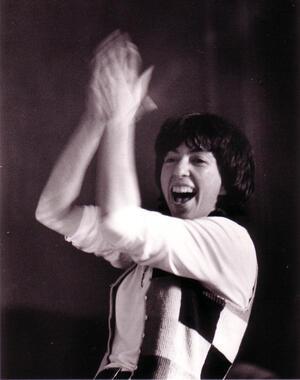Naomi Weisstein
In Chicago, one cold and sunny day in March of 1970, I was lying on the sofa listening to the radio. First, Mick Jagger crowed that his once feisty girlfriend was now “under his thumb.” Then Janis Joplin moaned with thrilled resignation that love was like “a ball and chain.”
I somersaulted off the sofa, leapt up into the air, and came down howling at the radio: “Rock is the insurgent culture of the era! How criminal to make the subjugation and suffering of women so sexy! We've got to do something about this! We'll... We'll organize our own rock band!” Why not see what would happen if we created visionary, feminist rock? Not only did every 14-year-old girl in the city listen to rock, but also every feminist did. We all identified with the counter culture; rock was considered “Our Music”: dangerous, sexy, and our harbinger of the social changes to come. No matter that rock assaulted women more savagely than anything in popular culture before it. The task would be to change the politics while retaining the impact.
And so I organized the Chicago Woman’s Liberation Rock Band (CWLRB). My goals were much too ambitious – a common problem at the time – but the band turned out to be remarkably successful in achieving many of the goals. We grew into a distinctive group of hip, talented, if inexperienced musicians.
We were explicitly, self-consciously political about our performances, while avoiding leaden sloganeering. We were an image of feminist solidarity, resistance, and power, and audiences loved us. Everywhere we went, we would be mobbed at the end of a performance, with the audience hugging the band and other members of the audience.
The band lasted three years and then broke up, reflecting all the problems that were at the same time devastating the radical women’s movement. Conflicts that once seemed easy to resolve, such as those of lesbians versus straights, began to feel insurmountable, and we started arguing too much and rehearsing too little.
The movement’s utopianism included the belief that there should be no leaders. We soon learned this ideal was untenable, but we persisted in thinking that if we were good enough feminists, we could function without any hierarchy. Amidst the appearance of structurelessness and leaderlessness, however, I was clearly the theatrical director, theoretician, healer of wounds, spiritual leader, and, if only by dint of a slight chronological advantage, “mother” to the band. When the women’s movement started trashing its leaders, the band turned on me for all the roles I had played. And three months after I left Chicago, the band dissolved.
Despite the CWLRB’s flaws, the band succeeded in conveying celebration and resistance. Its performances deliberately set up a politics of strong, defiant women, absolute democracy, and an intense desire for audience participation. Through the intensity of the medium, through our bad-ass revolutionary poetry, we shouted the news: we can have a new world, a just and generous world, a world without female suffering or degradation. It is an irony that the utopianism that had destroyed us was the same ingredient that made our performances so powerful.
Naomi Weisstein, while a Harvard graduate student in psychology (Ph.D., 1964), was forbidden entrance to the Lamont Library, which was closed to women, because, she was told “women are a distraction to men.” “You want distraction,” she said, “I'll show you distraction,” and she and friends with signs, a violin, and a clarinet positioned themselves underneath the windows of Lamont Library that evening and serenaded the scholars. She held a post-doctorate position in mathematical biology at the University of Chicago (1965-1966) where, in 1966, she founded the Chicago Women’s Liberation Union with Heather Booth, Jo Freeman, and Shulamith Firestone. In 1970, she organized the Chicago Women’s Liberation Rock Band and recorded with the New Haven Women’s Liberation Rock Band (1972: remastered, 2005). In addition, Weisstein has done stand up comedy, and was in Eve Merriam’s One Woman Show. She has been an invalid for many years, but collaborates with colleagues on experiments in neuroscience.




